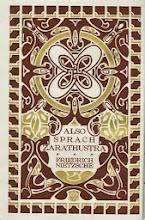An attempt at articulating the thesis of my Nietzsche book
Hey Dr. Money,
so I got your email and I would be more than happy to answer any questions that she wants to know about my general grad school experience or about the WMU program in particular. Tell her to shoot me an email with some specific questions and I will do my best to answer them on a timely basis.
I am also writing because I had to share this insight with somebody and only you would understand what I'm talking about. I'm reading this book called Religious and Philosophical Aspects of the Laozi for my Taoism class here and I ran across these two lines in the text:
‘Rothberg argues that the spiritual path involves, in many traditions, ‘a process of progressive deconstruction of the structures of experience’ and later on Harold Roth writes that ‘Rothberg argues, “each path of deconstruction or deconditioning is itself constructed or conditioned in a certain way.’
I think that I see all, if not the majority, definitely a substantial portion, of Nietzsche's philosophy as a sustained attempt to do this. To destroy, with a philosophy hammer, all of those 'structures of experience,' like Christian theology and Western philosophy and 'Reason' in philosophy, that prevent or hinder or oppress people from going on their on individual spiritual journey. The idols that he is attempting to destroy with his philosophy hammer are all of those idols, like Christian dogma, Platonic philosphy, Kantian philosophy, an individual's very idea of God, that are preventing them starting on their spiritual journey. That is why God must be murdered, because God represents all of those things, religious and philosophical dogma's, that are preventing you from finding the truth about existence, the truth about God, inside of yourself. That is why all must resist Zarathustra and seek themselves before Zarathustra returns to them, because they had not yet sought themselves they are living a disingenous, false life by living by these dogma's instead of finding the truth inside of themselves. This is how a statue can slay you. The plucking at zarathustra’s wreath is the desire on the part of the seeker to go on one’s own spiritual journey, the murdering of God, or your image or idea or dogma about God, is the first step on your spiritual journey, where you will find the God inside of you, or the Universal Self that is common to all mystic traditions. Nietzsche may or may not believe this last part here, but I do see in his writings this kind of mystical methodology in his comments about religion and free spirits. Once a person's God is murdered, then they are off on their own spiritual journey and truly for this once oppressed but now truly free spirits, there has never ever in the history of civilization been so many open sea's to find yourselves on.
I think that this is what I think about some of Nietzschean philosophy and would like to write a book to explore this idea to see if there is any validity to it or to see of other of Nietzsche's ideas would be in contradiction to it. I need to get this idea out of my head!
Thanks for your reply, hope to talk to you soon
Dr. Money's response:
I AGREE! With the one caveat that I believe Nietzsche is a naturalist
through and through...hence, if you want to continue employing
"religious" or "spiritual" in a naturalistic worldview, you would need
to make it clear that THAT is the context. After all, the words continue
to seep with meanings and connotations that have been attached to it
under very different conditions. I might employ the concept "witch," but
I do not mean to suggest women with supernatural powers, flying on
broomsticks, etc. Perhaps to avoid confusion, I should give up that
concept and use or invent another? Or if there are some connections that
I want to continue using, perhaps I use the older concept and try to
shift its meaning. This, itself, is destructive-constructive
interaction! And it is a more general philosophical issue on
individuation of concepts, meaning, etc. But I think it is related to
what you say.
Perhaps the deification of man that N is often charged with simply
amounts to the elimination (destruction) of community as the guide for
"spiritual journey" and the assertion and elevation of the individual?
Perhaps the connection between spiritual pre-N and spiritual post-N
(naturalistically construed) is the element of meaning or value. In the
end, I think N is an ethical philosopher, thinking about how to
understand ethics (broadly construed) in a new (and I would submit
"truer") worldview--naturalism.
.

